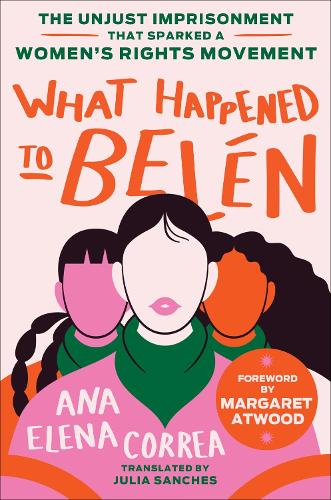
What Happened to Beln: The Unjust Imprisonment That Sparked a Women's Rights Movement
(Hardback)
Publishing Details
What Happened to Beln: The Unjust Imprisonment That Sparked a Women's Rights Movement
By (Author) Ana Elena Correa
Translated by Julia Sanches
Foreword by Margaret Atwood
HarperCollins Publishers Inc
HarperOne
14th February 2025
10th October 2024
United States
Classifications
General
Non Fiction
Social discrimination and social justice
Ethical issues, topics and debates: reproductive health, abortion and birth cont
Feminism and feminist theory
Human rights, civil rights
Political activism / Political engagement
History of the Americas
Social and cultural history
362.19888009
Physical Properties
Hardback
240
Width 152mm, Height 229mm, Spine 20mm
361g
Description
Foreword by Margaret Atwood
The heartbreaking true story of an Argentinian woman imprisoned for having a miscarriagean injustice that galvanized a feminist movement and became a global rallying cry in the fight for reproductive rights.
In 2014, Beln, a twenty-five-year-old woman living in rural Argentina, went to the hospital for a stomachacheand soon found herself in prison. While at the hospital she had a miscarriagewithout knowing she was pregnant. Because of the nations repressive laws surrounding abortion and reproductive rights, the doctors were forced to report her to the authorities. Despite her protestations, Beln was convicted and sentenced to two years for homicide.
Belns imprisonment is a glaring example of how womens health care has become increasingly criminalized, putting the most vulnerableBIPOC, rural, and low-incomewomen at greater risk of prosecution. Belns cause became the centerpiece of a movement to achieve greater protections for women like her. After two failed attempts to clear her name, Beln met feminist lawyer Soledad Deza, who quickly rallied Amnesty International and ignited an international feminist movement around #niunamasnot one moresymbolized by thousands of demonstrators around the globe donning white masks, the same kind of mask Beln wore when leaving prison. The #niunamas movement was instrumental in pressuring Argentine president Alberto Fernndez to decriminalize abortion in 2021.
In this gripping and personal account of the case and its impact on local law, Ana Correa, one of Argentinas leading journalists and activists, makes clear that what happened to Beln could happen to any womanand that we all have the power to raise our collective voices and demand change.
Translated by Julia Sanches
Author Bio
Julia Sanches is a literary translator working from Portuguese, Spanish, and Catalan. Recent translations include Boulder by Eva Baltasar, shortlisted for the International Booker Prize in 2023, and Migratory Birds by Mariana Oliver, for which she won the 2022 PEN translation prize. Born in Brazil, she currently lives in Providence, Rhode Island.
